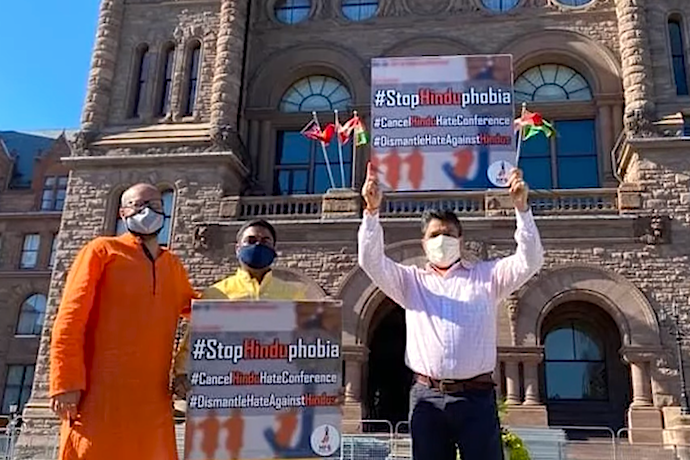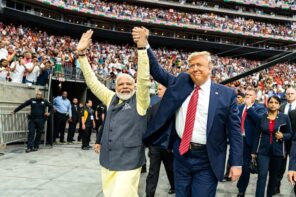Though you aren’t likely to read about it on the front page of the New York Times or spot it in trending topics on Twitter, for over two decades now North America has had a Hindu Nationalism problem. Scholars in the US and Canada working in the areas of Hinduism, Indian politics, and South Asian history have been targeted in campaigns of harassment and intimidation by right-wing Hindu nationalists. And despite the fact that such attacks have escalated significantly in 2021 in both frequency and scale, most Americans remain unaware of this growing threat to academic freedom and know little about its anti-intellectual instigators. We, as members of the South Asia Scholar Activist Collective, seek to change that by publishing a timeline that tracks the harassment of South Asian academics in North America as part of a larger project we call the Hindutva Harassment Field Manual.
The assaults on academic freedom that we document are orchestrated by far right groups and individuals who promote the political ideology of Hindutva, or Hindu nationalism. Structurally, Hindutva is similar to other exclusionary ideologies, such as white Christian nationalism and Islamism. In India, proponents of Hindutva seek to transform the constitutionally secular republic into an ethnonationalist Hindu state that would privilege Hindus above other groups (especially Muslims and Christians, the two largest religious minority communities in India).
In North America, Hindutva advocates claim the exclusive right to speak for all Indians about South Asian history, Hinduism, and the rights of Indian religious minorities. Crucially, they also seek to control what should and should not be taught in North American schools, colleges, and universities about these topics as well as who should teach them. Hindu nationalists attempt to silence those they deem to imperil their majoritarian political and cultural ambitions. In recent years, North American scholars have been primary targets of US-based Hindu Right groups with calls to cancel classes, conferences, books, and teaching contracts.
Academics who research South Asia may seem like an unlikely target for political opposition. We’re a significant minority within the United States academy, which is dominated by the study of Western traditions and world areas. Many of us spend our days reading languages considered obscure by most Americans (like Persian, Sanskrit, and Urdu), and our battles in the academy usually focus on the urgent need to integrate the study of non-Western cultures, religions, and societies much more significantly into North American education. Yet, even as we attempt to broaden curriculums, we face increasing adversity as the Hindu Right seeks to undermine scholarly expertise in approaching Indian pasts.
The political ideology of Hindu nationalism is only about 100 years old, being originally inspired by fascist movements in early 20th-century Europe. Hindu nationalists, led by the paramilitary political association, Rashtriya Swayamsevak Sangh (of which the current Indian Prime Minister Narendra Modi is a member), imagine the Indian past as an era of Hindu glory that was destroyed by despotic Muslim conquerors. This vision trades in crude tropes and demonizes Muslims, who have participated in Indian cultures for well over 1,000 years and are subjected to increasing Hindutva violence in the 21st century. The Hindutva revisionist historical project seeks to rebrand Indian society as Hindu alone, akin to Christian nationalist ambitions in the United States.
In India, Hindu nationalism—including its anti-intellectual bent—has grown tremendously in influence over the last several decades. Hindu nationalist organizations and their supporters regularly use legal and extralegal means to infringe on the academic freedoms of our India-based academic colleagues. They’ve successfully banned texts and authors who refuse to toe the Hindutva line, appointed unqualified ideologues to prestigious academic posts, cancelled lectures by renowned scholars, vilified academics as ‘anti-national,’ and even physically assaulted students on campuses. Our alarm at seeing some of these tactics adapted to the North American context is what inspired the creation of the harassment timeline.
At this point the timeline documents approximately two dozen specific Hindu nationalist assaults on scholars and academic institutions in North America between the mid-1990s and 2021. This record enables us to establish a broad pattern of attacks by Hindutva organizations on the North American academy over a period of nearly thirty years, which is urgent and necessary. One key tactic these assaults all share is that they seek to isolate the target, most often a specific individual, and make her feel vulnerable and alone. We hope that by collating a timeline of specific attacks, our colleagues—both those targeted and the many watching from the sidelines—might see that we stand together to resist anti-intellectual pressures.
The timeline also offers insight regarding specific tactics and objectives, such as the political pressure against academic consensus that was mobilized in the California textbook controversies of 2005 and 2016-17. In both instances, Hindu Right groups based in the United States attempted to pressure California’s Curriculum Commission to whitewash aspects of South Asian history in school textbooks, including by eliminating references to caste-based discrimination and patriarchy.
Both campaigns utilized arguments well-established in US discourse by white supremacists. For instance, just as white parents have argued that teaching about anti-Black racism will result in white children being bullied, the Hindu Right argued that teaching about caste-based discrimination would result in Hindu (upper caste) children being bullied. White supremacists and Hindu supremacists share a desire to discriminate without consequences.
The Hindu Right has also mobilized to intimidate scholars and academic institutions with an eye to dissuading any research at all on Hindu nationalism. This was evidenced, most recently, in the unrestrained harassment earlier this year of organizers, speakers, and even attendees of a virtual academic conference, “Dismantling Global Hindutva: Multidisciplinary Perspectives.” A combination of US-based and India-based Hindu supremacist groups threatened both conference speakers and sponsors. Several speakers pulled out because of intimidation, which included violent threats, while North American universities were subjected to more than one million emails and other tactics pressuring them to withdraw support for the academic event.
Taken as a whole, the timeline allows us to glimpse the rich diversity of academic ideas and perspectives that we stand to lose if Hindutva harassment of academics continues to flourish on North American soil. The academy needs more critical thought about South Asia, not less. Academic freedom is the very heart of the globally envied North American education system. In actively trying to undermine our educational and research efforts in North America, the Hindu Right impoverishes the study of South Asia, and, moreover, it assaults the justly cherished foundation of academic inquiry itself.





